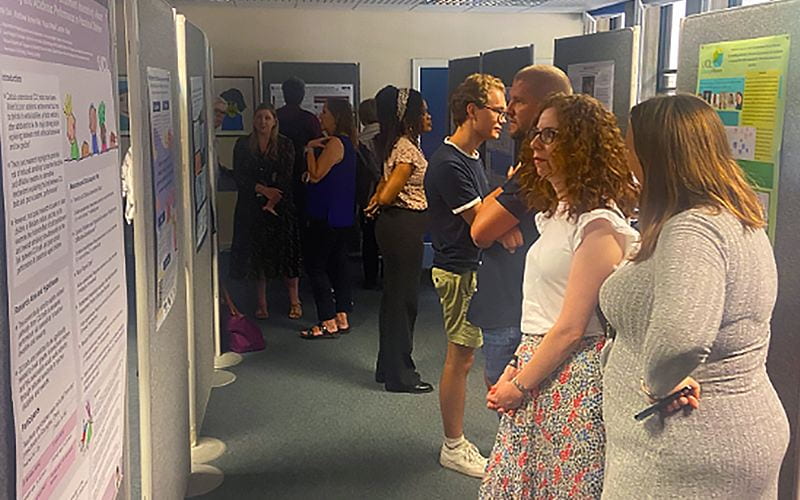‘Psyched’ about education research
By IOE Blog Editor, on 21 December 2023

Image permission: Miriam McBreen.
21 December 2023
By Zahra Siddiqui, Psychology and Human Development MPhil/PhD
This year, our Department of Psychology and Human Development (PHD – yes, the department, not the title!) organised the Psyched in Education conference to showcase all our ongoing work and research. This celebratory event featured presentations from every level of our development, from Master’s students through to professors. It was a great day to spend time with the department, celebrating the remarkable research we’ve been conducting, and fostering a supportive environment for discussing our work together. I’ll be going through some of my personal highlights from the day – and all the new things I learnt from the department!
The day was divided into four topics: mental health and wellbeing; schools and education; literacy and numeracy; and disability. I’ll be giving an overview of some of my favourite pieces of work from each of the four sessions.
On mental health research
The first session on mental health covered talks spanning all age groups, from young people to higher education, to parents. In particular, I found the presentation by Dr Liory Fern-Pollak especially interesting. Dr Liory discussed her experience and gave some advice on teaching university students about the brain using creative methods. I really liked that Dr Liory highlighted the importance of creating a nurturing learning environment. This presentation gave me lots of inspiration for adapting my future teaching methods. We also watched other interesting research presentations, focusing on mental health in PhD students. These works showed the significance of working together, which was the aim of the Psyched in Education conference.
On school and education
The second session focused on school and education, and one presentation that I really enjoyed came from PhD student Louise Livingston. She shared her research on the impact of different environments, ranging from mainstream to Montessori settings, and how such environments may influence many important outcomes like motor cognition, executive function and academic, social and self-regulation. This presentation really made me reflect about the ways we can harness the learning environment for young children to ensure they are maximally benefiting from their learning experience. Plus, it was great to network with another PhD student during the event. What also stood out to me in the school and education presentations was the international research within the department, with research being carried out in Jamaica and Ecuador.
On numeracy and literacy
During the afternoon, the talks focused on numeracy and literacy. I particularly enjoyed the presentation focusing on CPD (continuing professional development) for teachers by Dr Miriam McBreen. Her presentation really demonstrated how our departmental research is dedicated to improving the development in teachers. Dr Miriam discussed a project comparing two CPD programmes – a collaborative training program and a more traditional training programme – to see how this may impact children’s reading abilities after the fact. This presentation again highlights the importance of collaboration, both in research projects, and also in training and learning.
On disabilities
The final session focused on disabilities, with a specific focus on factors that predict educational outcomes and how educational outcomes can be improved through interventions at home and in the classroom. Although there is still much more progress waiting to be made, many efforts are being made with all stakeholders included – parents, teachers, researchers and the children themselves. It was particularly great to see work from my own lab being presented at the conference. Fellow PhD student Stella Xu and I are both members of the Child Development and Learning Difficulties Lab (CDLD), and as such, it was great to see her present her PhD to the rest of the department. Her work focuses on the mathematical development of children with a rare genetic condition called Williams Syndrome. She discussed how these children have different cognitive profiles, and how research into these cognitive profiles will aid us in supporting their mathematical development. Her work is part of a larger collaborative project called the WisDom database, where many researchers across many instructions have come together to share data – to reach the common goal of understanding the cognitive development and cognitive profiles of children with Williams Syndrome.
Final thoughts
What surprised me during the day was the wide range of methodologies: from longitudinal data sets to surveys, interventions and experimental studies, as well as meta-analysis, all by students and staff. There was a real buzz in the room with many questions and supportive input from the audience. I also really enjoyed taking this opportunity to celebrate and collaborate with the whole department together and meet researchers and PhD students from the department that I’d not met before! The whole conference really highlighted to me the important themes of collaboration and scientific rigour.
I thoroughly enjoyed the day and look forward to the Psyched in Education Conference next year!
Hear more in the Psyched about education podcast series, also available on Soundcloud.
 Close
Close


